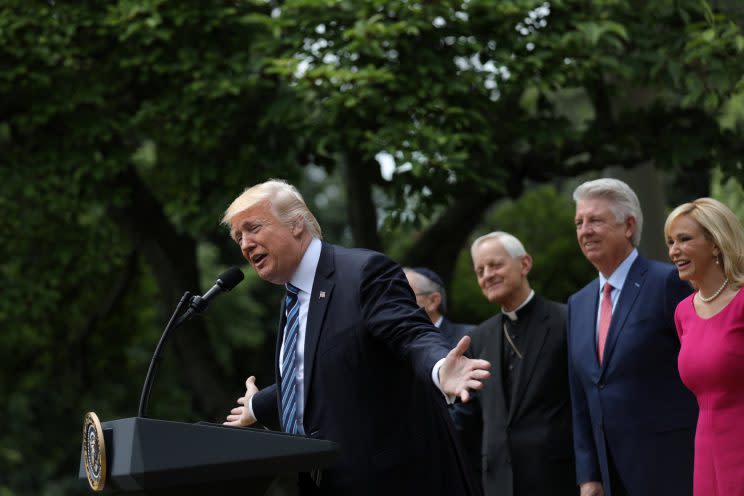Trump to visit Saudi Arabia in first foreign trip, seeking new ties with Muslim world
WASHINGTON — President Trump announced Thursday that his first foreign destination since taking office will be Saudi Arabia, where he will join leaders from across the Muslim world late this month to seek a new covenant to battle extremism and confront Iran.
Trump will go from there to Israel and on to the Vatican, a tour of the world’s three major monotheistic religions, before meeting leaders of the Group of Seven rich countries and NATO in separate summits in Brussels and Sicily.
Speaking in the Rose Garden of the White House, the president said his travels would open with “a truly historic gathering in Saudi Arabia with leaders from all across the Muslim world.”
“It is there that we will begin to construct a new foundation of cooperation and support with our Muslim allies to combat extremism, terrorism and violence and to embrace a more just and hopeful future for young Muslims in their countries,” he said.
“Our task is not to dictate to others how to live but to build a coalition of friends and partners who share the goal of fighting terrorism and bringing safety, opportunity and stability to the war-ravaged Middle East,” he said.
The diplomatic voyage comes after Trump spoke harshly during the 2016 campaign about America’s relationship with NATO as well as with traditional trading partners, and after he imposed a partial version of what he has repeatedly described as a “ban” on travel from several Muslim-majority countries. As candidate, Trump promoted an “America first” foreign policy that called for destroying ISIS while resisting entanglements in peacemaking or nation-building.

“America first is fully compatible with American leadership in the world,” a senior administration official told reporters after Trump spoke. “What this trip will also do is it will reverse what had been a trend, I think, of America’s disengagement from the world and some of its biggest problems.”
And, the official said, that disengagement “has aided and abetted those who were really fomenting violence and perpetuating human suffering across the Middle East in particular.”
Trump’s travels will come in late May — he did not specify dates for the first three stops, but the NATO summit opens on May 24 and the G7 talks run May 25-26. The Vatican announced Trump would meet Pope Francis on May 24. While he has hosted a parade of foreign leaders at the White House and his private Mar-a-Lago club in Florida, he has not gone abroad.
Trump will also push Middle East peace during the trip, and look to harness what senior aides described as regional unity to confront Iran, which has historically been Saudi Arabia’s biggest regional rival. It was not immediately clear who would be at the gathering in Riyadh, the Saudi capital.
Trump’s remarks reflected his administration’s rhetorical shift away from publicly playing up human rights criticisms in some bilateral relationships and emphasizing instead the need to enlist willing allies in the fight against terrorism, chiefly the so-called Islamic State, also known as ISIS.
Shortly after taking office, the president ordered a review of the strategy to defeat ISIS. Officials have told Yahoo News that rather than wait to agree on every aspect of a new approach, the United States has been implementing new tactics as they are devised. The president has also ordered a review of the nuclear deal between Iran and major world powers, including the United States, a top priority of former President Barack Obama. Under the deal, Iran has received relief from multilateral sanctions that crippled its economy in return for bowing to an international monitoring regime designed to ensure that it cannot develop nuclear weapons.
Trump met with Palestinian leader Mahmoud Abbas on Wednesday. He has also hosted Egyptian President Abdel-Fattah el-Sissi, Jordan’s King Abdullah II, Israeli Prime Minister Benjamin Netanyahu, and Saudi Arabia’s Deputy Crown Prince Mohammed bin Salman.
Aides declined to say whether Trump would visit Abbas in Ramallah, the administrative center of the Palestinian National Authority, to bring together the Palestinian leader and Netanyahu. Asked whether the president would announce that he is making good on his promise to move the U.S. embassy from Tel Aviv to Jerusalem, a top adviser replied: “We’ll get to that when we get to that.”
Asked about the sincerity of Saudi Arabia’s commitment to battling extremism, given its history with funding schools accused of promoting radicalism and even violence, one senior official replied: “We’ll see, but we’re optimistic.”
Trump’s visit will bring him face to face with Pope Francis, who during the 2016 campaign criticized the entrepreneur’s signature plans to build a wall on the border with Mexico. “A person who thinks only about building walls, wherever they may be, and not building bridges, is not Christian,” the pope said.
Trump responded on Facebook: “If and when the Vatican is attacked by ISIS, which as everyone knows is ISIS’s ultimate trophy, I can promise you that the pope would have only wished and prayed that Donald Trump would have been president because this would not have happened.”
Read more from Yahoo News:
Comey dismisses gossipy WikiLeaks coverage as ‘intelligence porn’
Trump fires back at Clinton: ‘Perhaps Trump just ran a great campaign?’
Comey says he is ‘mildly nauseous’ over possibility his October letter led to Clinton loss
As Trump prepares order on religious liberty, Pence’s credibility with evangelicals is at stake



